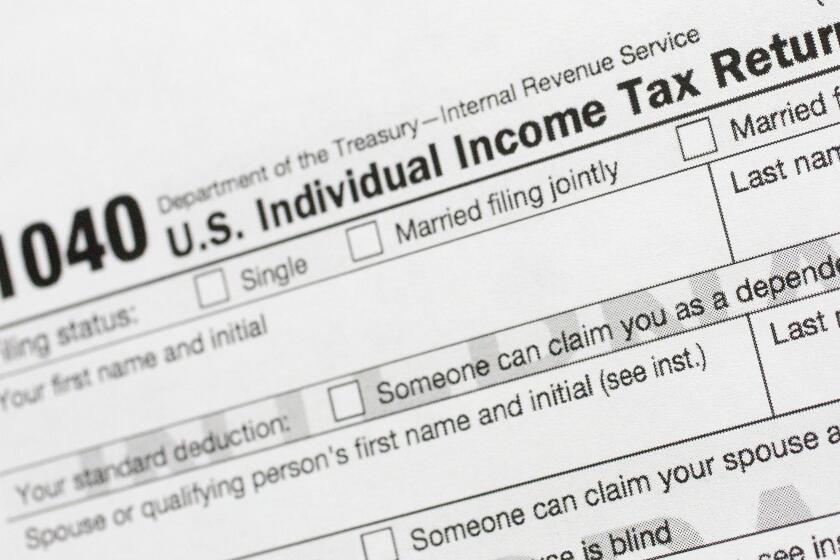President Trump is late-night TV’s muse and viewers are loving it
While TV news pundits were still analyzing President Trump’s first address to Congress on Tuesday, Stephen Colbert was already milking it for late-night laughs.
“The female members of the House Democratic caucus all wore white in honor of women’s suffrage — while the Republicans were white in honor of who elected them,” the “Late Show” host told a crowd of 400 cheering fans during a live broadcast Tuesday at the Ed Sullivan Theater.
After languishing in second place since he succeeded David Letterman on the CBS franchise in September 2015, Colbert has become the most-watched show in late-night TV since the week of Trump’s Jan. 20 inauguration. He has risen to 3 million viewers a night — enough to surpass longtime ratings leader “The Tonight Show With Jimmy Fallon” on NBC for four consecutive weeks.
Colbert and other late-night talk show hosts are being lifted by the wave of TV viewers turning to late-night comedy to cope with their angst over the new administration. Overtly political hosts who have designated Trump as the piñata-in-chief — HBO’s Bill Maher and John Oliver and TBS’ Samantha Bee — are also experiencing significant ratings increases during a post-election period when their audience levels typically ebb. Comedy Central’s “The Daily Show” is on track to have its best quarterly ratings since Trevor Noah took over for Jon Stewart as host.
The rolling disclosures of Trump campaign contacts with Russian ambassadors, a succession of executive orders, an aggressive deportation policy for undocumented immigrants and ugly confrontations with the press provide plenty of material for comics who find themselves serving an uneasy audience.
“Humor is relieving the tension in a much more potent way now,” said Scott Carter, executive producer and head writer for HBO’s “Real Time With Bill Maher.” “They have a lot of anxiety that we’re addressing. It’s the unpredictability of both the president and the people who surround him who often seem to contradict him.”
I want to keep up with what’s going on and not get sad.
— Yasmin Merchant, 22, a student at Fordham University
The sentiment was shared by some of the Colbert fans who stayed up for the rare live performance (“Late Show” typically tapes at 5:30 p.m. Eastern) at the Ed Sullivan Theater, just a few blocks north of Times Square.
For audience member Daniel Dieter, a 27-year-old software company employee in New York City, Colbert’s riffs on Trump and the divided nation he is presiding over have become a nightly ritual.
“I’m definitely watching more frequently,” Dieter said. “It’s a nice release. Comedy provides a good avenue to get to the truth of things.”
Yasmin Merchant, 22, a student at Fordham University, added: “I want to keep up with what’s going on and not get sad.”
Colbert’s executive producer Chris Licht, a former TV news executive, declined to comment for this story, preferring that the show’s comedy speak for itself.
But the consensus in the TV industry is that the unexpected shift in the political landscape plays to the Colbert’s strength as a satirist and is giving him a distinctive voice that many believed had gone missing since he took over “The Late Show.”
In 2017, Colbert’s audience is up 9% while NBC’s Fallon is off 18% from a year ago, according to Nielsen. It was the first time that CBS topped NBC in late night in February since 2010.
“It’s taken him 17 months to get to this,” said Jason Maltby, managing director, director of national broadcast TV for media buying firm Mindshare. “He had a rough start in the switch from Comedy Central to CBS. They struggled with what the tenor of the show was and who he was, versus the Colbert from Comedy Central.”
Maltby notes that NBC’s Fallon still has the ratings lead among viewers in the 18 to 49 age group, the main target for advertisers buying commercials on late-night shows, although that number has slipped as well. The “Tonight” ratings falloff has hurt the audience lead-in to “Late Night With Seth Meyers,” which has also declined despite having more pointed political humor.
The rise in viewers for Colbert will increase advertiser demand for his show, Maltby added, as large audiences for live TV are harder to reach given the growing number of video choices. The average price of a 30-second spot on “The Late Show” went for $21,129 in January, up 6.6% from the previous month, according to Standard Media Index.
NBC is well aware of what the public’s fascination with Trump can do to viewing habits. “Saturday Night Live” — which has stepped up its political content this season with Alec Baldwin’s instantly iconic Trump impersonation and stinging lampoons of his staff by Melissa McCarthy and Kate McKinnon — is having its most-watched season in 24 years.
But political junkies looking for like-minded comic commentary apparently want a fix every night.
San Francisco software company Samba TV has been studying viewing patterns since the election and looked at the overlap of the late-night audience with viewers of Fox News, the most preferred source for Trump voters, and MSNBC, the favorite among progressives.
Based on data the company collects from cable set top boxes, Colbert’s audience of politically liberal viewers has doubled since the election, offsetting a decline in conservative viewers. The political makeup for the viewers of Fallon and ABC’s “Jimmy Kimmel Live” have remained the same as before the election.
Maltby noted that “The Tonight Show” has a history of being politically even-handed to reach a broad-based audience (it was former First Lady Laura Bush’s favorite late-night show when her husband, George W. Bush, was in the White House).
Fallon often mocks Trump in his monologue and comedy bits (although some critics winced when he playfully tousled candidate Trump’s hair on “Tonight” during the campaign season.)
But Colbert consistently riffs off the latest headlines about the president and his cohorts every day from the show’s cold open, through his monologue and typically into in-depth political segments that are reminiscent of the broadsides that made him a favorite on Comedy Central. His jabs at Trump are even featured in the network’s red, white and blue-laden on-air promotions for the show (which is now touted as “the smart choice”).
The same intensity is driving the ratings for “Real Time With Bill Maher,” which is up 52% compared with the first quarter of 2016.
“The administration seems to work with the fluidity of an improv team,” said Carter, the head writer. “I think that’s captivated people. In one sense, our jobs are made easier in that the audience is already focused when the show starts at 7 o’clock on a Friday.… It’s made our job harder in that what happened in the morning is obsolete. The last joke is written five minutes before 7, right before Bill goes on.”
The extended political high season is creating new franchises as well. Bee’s “Full Frontal,” often a devastating half-hour comic assault on the Trump White House, has become the most-watched late-night show among viewers in the 18 to 34 age group just one year after its launch. TBS says 3.4 million people are watching it each week across TV and online platforms.
“Samantha Bee could not have hit at a better time,” said David Levy, president of TBS parent Turner Broadcasting. “That show was in development prior to the election. But now that it’s on our air — she’s probably the hottest commodity right now. I think you’re going to see a lot of shows like that possibly pop up as well.”
Twitter: @SteveBattaglio
ALSO
Bill Maher’s ‘Real Time’ interview with Milo Yiannopoulos fuels new criticism
Samantha Bee on the ‘Full Frontal’ move to Wednesdays and why she has no fear in the Trump age
Samantha Bee says Jimmy Fallon and NBC ‘tacitly condoned race-baiting demagogue’ Donald Trump
More to Read
Inside the business of entertainment
The Wide Shot brings you news, analysis and insights on everything from streaming wars to production — and what it all means for the future.
You may occasionally receive promotional content from the Los Angeles Times.










